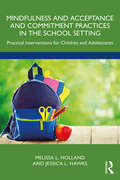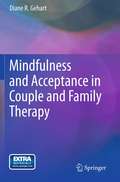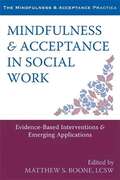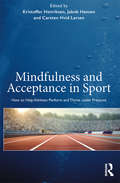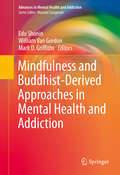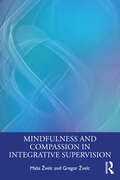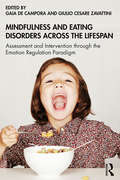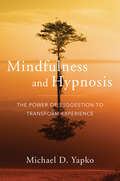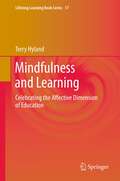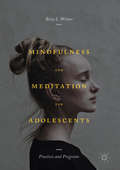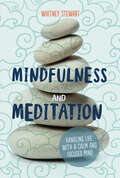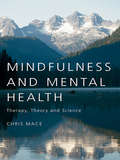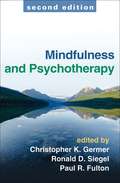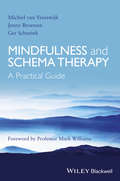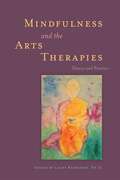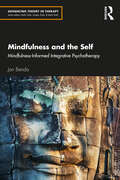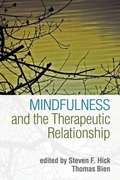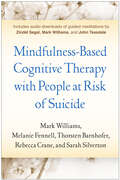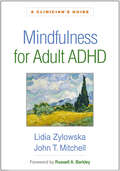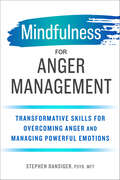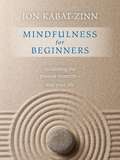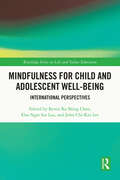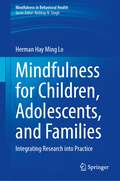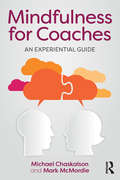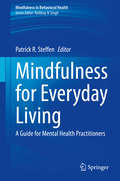- Table View
- List View
Mindfulness and Acceptance and Commitment Practices in the School Setting: Practical Interventions for Children and Adolescents
by Melissa L. Holland Jessica L. HawksThis book offers specific, easy-to-implement mindfulness and acceptance and commitment therapy (ACT) tools for practitioners to use in schools at an individual, group, or classroom-wide level. With the increased focus on the emotional and behavioral health of children in the schools, there is a dearth of practical books that specifically address the use of ACT techniques in the school setting. Geared toward the practitioner and how they work with students, teachers, parents, and classrooms, this book introduces a contemporary approach to targeted intervention and discusses how these services can be provided using an MTSS model. These interventions have numerous benefits including increasing attention capacity, compassion, emotional regulation, and self-calming abilities, in addition to use as an intervention for anxiety, depression, and trauma related symptoms. Graduate students and practitioners who work with children and adolescents such as school psychologists, child and adolescent clinical psychologists, and school counselors will find this book to be a novel resource of interventions for children in grades K–12, along with tools to support parents and teachers.
Mindfulness and Acceptance in Couple and Family Therapy
by Diane R. GehartThis book reviews the research and philosophical foundations for using mindfulness, acceptance, and Buddhist psychology in couple and family therapy. It also provides a detailed and practical approach for putting these ideas into action in the therapy room, including a mindful approach to therapeutic relationships, case conceptualization, treatment planning, teaching meditation, and intervention.
Mindfulness and Acceptance in Social Work: Evidence-Based Interventions and Emerging Applications (Context Press Mindfulness And Acceptance Practica Ser.)
by Matthew S. BooneSocial work focuses on serving the most vulnerable members of society, and social workers must often address the contextual forces that contribute to human problems. Mindfulness and acceptance are powerful tools for this practice. By offering interventions like dialectical behavior therapy (DBT), mindfulness-based stress reduction (MBSR), and acceptance and commitment therapy (ACT), social workers can help their clients become more aware and take effective action. <p><p>In Mindfulness and Acceptance in Social Work, editor and social worker Matthew S. Boone brings together contributions from emerging voices in social work, such as Elana Rosenbaum, Yuk-Lin Renita Wong, and Diana Coholic, along with ACT pioneers Kirk Strosahl, Patricia Robinson, and others. This book focuses not only on mindfulness-based interventions for direct practice, but also on the intersection of mindfulness and social work education, cultural diversity, and macro social work. It includes a framework for moving past culturally-informed biases, and for how to best utilize mindfulness interventions for both individuals and the community at large.
Mindfulness and Acceptance in Sport: How to Help Athletes Perform and Thrive under Pressure
by Kristoffer Henriksen Jakob Hansen Carsten Hvid LarsenMindfulness- and acceptance-based approaches such as Acceptance and Commitment Therapy (ACT) and Mindfulness Acceptance Commitment (MAC) are gaining momentum with sport psychology practitioners who work to support elite athletes. These acceptance-based, or third wave, cognitive behavioral approaches in sport psychology highlight that thought suppression and control techniques can trigger a metacognitive scanning process, and that excessive cognitive activity and task-irrelevant focus (self-focused attention such as trying to change thoughts) disrupts performance. Using this perspective, the aim of sport psychology interventions is not to help the athletes engage in the futile task of managing and controlling internal life. Rather, it suggests that sport psychology practitioners should work to increase athletes’ willingness to accept negative thoughts and emotions in pursuit of valued ends. Key aspects of such interventions include: teaching athletes to open up and accept, teaching athletes to mindfully engage in the present moment, and helping athletes formulate the values and engage in committed actions towards these values. The goal of Mindfulness and Acceptance in Sport: How to Help Athletes Perform and Thrive under Pressure then is to provide students, researchers, practitioners, and coaches of sport psychology with practical guidance for implementing mindfulness and acceptance approaches in their work with athletes. This book brings together highly experienced practitioners and shares their working methods, exercises, and cases to inspire the sport psychology profession.
Mindfulness and Buddhist-Derived Approaches in Mental Health and Addiction
by Edo Shonin William Van Gordon Mark D. GriffithsThis book provides a timely synthesis and discussion of recent developments in mindfulness research and practice within mental health and addiction domains. The book also discusses other Buddhist-derived interventions - such as loving-kindness meditation and compassion meditation - that are gaining momentum in clinical settings. It will be an essential text for researchers and mental health practitioners wishing to keep up-to-date with developments in mindfulness clinical research, as well as any professionals wishing to equip themselves with the necessary theoretical and practical tools to effectively utilize mindfulness in mental health and addiction settings.
Mindfulness and Compassion in Integrative Supervision
by Gregor Žvelc Maša ŽvelcMindfulness and Compassion in Integrative Supervision presents an original integrative and transtheoretical approach to supervision that emphasises the importance of mindful awareness and compassion in supervision practice. Psychotherapists are taught about importance of compassion for their clients, while the role of bringing self-compassion toward themselves is often neglected. This book offers novel perspectives on mindful awareness, self-compassion, physiological synchrony, and emotional regulation in supervision. It presents various mindfulness- and compassion-oriented methods and interventions that are used within an attuned supervisory relationship. Through vignettes and transcripts of supervision sessions, the authors illustrate the power of mindful awareness and self-compassion to transform supervisees’ dysregulated experience related to their psychotherapy work. The book embraces all main dimensions of human experience: physiological, affective, relational, cognitive, behavioural, spiritual, and contextual. The book will have an international appeal amongst supervisors from different supervision approaches and psychotherapists/counsellors who may find it useful for their practice, self-care and the prevention of burnout.
Mindfulness and Eating Disorders across the Lifespan: Assessment and Intervention through the Emotion Regulation Paradigm
by Gaia De CamporaThis important and well researched volume examines the clinical phenomenon of eating disorders, exploring their longitudinal risk trajectory and introducing the Mindful Emotion Regulation – Approach (MER-A) as a starting point for intervention. The book reviews various eating problems that can originate from the earliest perinatal phase to early adolescence, and through the MER-A framework focuses on how the principles of mindfulness and the related theoretical and clinical bases underlying the construct of emotional regulation can guide the clinician to a deeper understanding of a patient’s disordered eating. Featuring reflections on clinical cases, it includes coverage of patients’ difficulties in regulating emotions, their relationships with various eating behaviours and their associated interpersonal features. Mindfulness and Eating Disorders across the Lifespan represents an attempt to provide a complete appreciation of this complex and multifaceted topic, making it of great importance to psychotherapists and related mental health professionals working with eating disorders.
Mindfulness and Hypnosis: The Power of Suggestion to Transform Experience
by Michael D. YapkoHow mindfulness and hypnosis in a clinical context work to help foster change. In recent years mindfulness has become integrated into many clinicians' private practices, and become a staple of hospital and university based treatment programs for stress reduction, pain, anxiety management, and a host of other difficulties. Clinicians are now routinely encouraging their clients to focus, be aware, open, and accepting, and thereby derive benefit from the mindfulness experience. How has mindfulness, a treatment tool that might easily have been dismissed as esoteric only a few short years ago, become so widely accepted and applied? One obvious answer: Because it works. The empirical foundation documenting the therapeutic merits of mindfulness is already substantial and is still growing. This is not a book about documenting the therapeutic merits of mindfulness, however. Rather, this book is the first of its kind to address how and most importantly why guided mindfulness meditations can enhance treatment. The focus in this book is on the structure of guided mindfulness meditations and, especially, the role of suggestion in these processes. Specifically, one of the primary questions addressed in this book is this: When a psychotherapist conducts guided mindfulness meditations (GMMs) for some clinical purpose, how does mindfulness work? In posing this question other questions arise that are every bit as compelling: Do GMMs contain structural elements that can be identified and amplified and thereby employed more efficiently? How do we determine who is most likely to benefit from such methods? Can GMMs be improved by adapting them to the needs of specific individuals rather than employing scripted "one size fits all" approaches? Discussing the role of suggestion in experience and offering the author's concrete suggestions for integrating this work into psychotherapy, this book is a practical guide to hypnosis, focusing, and mindfulness for the clinician.
Mindfulness and Learning: Celebrating the Affective Dimension of Education
by Terry HylandIn recent decades, education at all levels has been seriously impoverished by a growing obsession with standards, targets, skills and competences. According to this model, only a circumscribed range of basic cognitive skills and competences are the business of education, whose main role is to provide employability credentials for people competing for jobs in the global economy. The result is a one-dimensional, economistic and bleakly utilitarian conception of the educational task. In Mindfulness and Learning: Celebrating the Affective Dimension of Education, Terry Hyland advances the thesis that education stands in need of a rejuvenation of its affective function - the impact it has on the emotional, social, moral and personal development of learners. Drawing on the Buddhist conception of mindfulness, he advances a powerful argument for redressing this imbalance by enhancing the affective domain of learning. Mindfulness and Learning: Celebrating the Affective Dimension of Education shows how the concept and practice of 'mindfulness' - non-judgmental, present moment awareness and experience - can enrich learning at all levels. Mindfulness thus contributes to the enhanced achievement of general educational goals, and helps remedy the gross deficiency of the affective/emotional aspects of contemporary theory and practice. The author outlines a mindfulness-based affective education (MBAE) programme and shows how it might be introduced into educational provision from the early years to adult education with a view to harmonising the cognitive-affective balance across the system.
Mindfulness and Meditation for Adolescents
by Betsy L. WisnerThis book describes mindfulness and meditation practices and programs for adolescents by situating the topic in a bio-psychosocial-cultural approach. Using this framework, the benefits of these practices and programs for adolescents— with an emphasis on evidence-based practices—are explored. In addition to programs based on mindfulness, meditation programs using Transcendental Meditation, Herbert Benson’s Relaxation Response, and the Center for Mind Body Medicine’s group programs are discussed. The book is targeted toward educators, mental health professionals, researchers, and graduate students interested in the application, development, and study of mindfulness and meditation practices and programs for adolescents.
Mindfulness and Meditation: Handling Life with a Calm and Focused Mind
by Whitney StewartFrom hormones to homework, parents to peers, health issues to bad habits, life can be a pressure cooker. How can we find relief? Author Whitney Stewart introduces readers to the practice of mindfulness. With its roots in ancient Buddhist teachings, mindfulness—the practice of purposefully focusing attention on the present moment—can change a person's approach to stress, develop skills to handle anxiety and depression, and provide a sense of awareness and belonging. Stewart guides readers through how to get started with meditation as well as provides specific exercises for examining emotions, managing stress, checking social media habits and wellness routines, and setting intentions to increase happiness. "A thorough and accessible resource for young people."—Kirkus Reviews "Considering the range of challenges that today's teens face, equipping them with pertinent coping skills is crucial for their future success and well-being. . . . [S]traightforward and refreshing."—School Library Journal
Mindfulness and Mental Health: Therapy, Theory and Science
by Chris MaceBeing mindful can help people feel calmer and more fully alive. Mindfulness and Mental Health examines other effects it can also have and presents a significant new model of how mindful awareness may influence different forms of mental suffering. The book assesses current understandings of what mindfulness is, what it leads to, and how and when it can help. It looks at the roots and significance of mindfulness in Buddhist psychology and at the strengths and limitations of recent scientific investigations. A survey of relationships between mindfulness practice and established forms of psychotherapy introduces evaluations of recent clinical work where mindfulness has been used with a wide range of psychological disorders. As well as considering current 'mindfulness-based' therapies, future directions for the development of new techniques, their selection, how they are used and implications for professional training are discussed. Finally, mindfulness' future contribution to positive mental health is examined with reference to vulnerability to illness, adaptation and the flourishing of hidden capabilities. As a cogent summary of the field that addresses many key questions, Mindfulness and Mental Health is likely to help therapists from all professional backgrounds in getting to grips with developments that are becoming too significant to ignore.
Mindfulness and Psychotherapy, Second Edition
by Ronald D. Siegel Paul R. Fulton Christopher K. GermerThis practical book has given tens of thousands of clinicians and students a comprehensive introduction to mindfulness and its clinical applications. Leading practitioners in the field present clear-cut procedures for implementing mindfulness techniques and teaching them to patients experiencing depression, anxiety, chronic pain, and other problems. Also addressed are ways that mindfulness practices can increase acceptance and empathy in the therapeutic relationship. The book describes the philosophical underpinnings of mindfulness and reviews the growing body of treatment studies and neuroscientific research. User-friendly features include illustrative case examples and practice exercises. New to This Edition *Incorporates significant empirical advances--mindfulness has become one of the most-researched areas in psychotherapy. *Most chapters extensively revised or rewritten. *Chapters on practical ethics, trauma, and addictions. *Greater emphasis on the role of acceptance and compassion in mindfulness.
Mindfulness and Schema Therapy
by Michiel Van Vreeswijk Jenny Broersen Ger SchurinkMindfulness and Schema Therapy presents an eight-session + two follow up sessions protocol for schema mindfulness for therapists and their patients. Represents the first book to integrate the theory of schema therapy with the techniques of mindfulnessEnhances schema therapy with techniques drawn from mindfulness-based cognitive therapy (MBCT) - a unique integration of two of the most popular treatment approaches in clinical psychology today.Merges two of the hottest topics in contemporary clinical psychology and psychotherapyOffers a practical guide for training and practice, with detailed coverage of theory followed by dedicated sections for therapists and patientsFeatures a variety of exercises enabling readers to immediately implement the protocolWritten by authors with expertise and experience in both schema therapy and mindfulnessIncludes a Foreword by Mark Williams, renowned for his contribution to the development of MBCT
Mindfulness and the Arts Therapies: Theory and Practice
by Michael Franklin Bonnie Gabriel David Payne John Fox Janet Surrey Pat Allen Daniel Herring Nancy Beardall Caroline Peterson Sidney Trantham Jennifer Tantia Laury Rappaport Schwanbeck Schwanbeck Emily Tara Weiner Shaun Mcniff Gabriella Ventrella Karin Von Daler Paola Luzzatto Lucia Minerbi Carolyn Van Dort Debra L. Kalmanowitz Patricia Isis Gemma Oldrini Jared D. Kass Merryl Rothaus Denise Grocke Anna Lagomaggiore Joel Gluck Jürgen Fritsche Ellen Mullin Fiona Chang Zoe Arlene AvstreihThis ground-breaking book explores the theoretical, clinical and training application of integrating mindfulness with all of the arts therapies, and includes cutting-edge contributions from neuroscience. Written by pioneers and leaders in the arts therapies and psychology fields, the book includes 6 sections that examine mindfulness and the arts therapies from different perspectives: 1) the history and roots of mindfulness in relation to spirituality, psychotherapy and the arts therapies; 2) the role of the expressive arts in cultivating mindful awareness; 3) innovative approaches that add mindfulness to the arts therapies; 4) arts therapies approaches that are inherently mindfulness-based; 5) mindfulness in the training and education of arts therapists; and 6) the neuroscience underlying mindfulness and the arts therapies. Contributors describe their pioneering work with diverse applications: people with cancer, trauma, chronic pain, substance abuse, severe mental illness, clients in private practice, adolescents at camp, training dance and art therapists, and more. This rich resource will inspire and rejuvenate all clinicians and educators.
Mindfulness and the Self: Mindfulness-Informed Integrative Psychotherapy (Advancing Theory in Therapy)
by Jan BendaThe image we have of ourselves is shaped during our childhood and is often influenced by various emotional wounds. Mindfulness and the Self describes four types of these wounds and shows how they can be healed and transformed through developing mindfulness and self-compassion.Grounded in the innovative Mindfulness-Informed Integrative Psychotherapy framework, this book presents a revolutionary phenomenological model of maladaptive schemas and redefines our understanding of mental disorders. It offers practical procedures to uncover hidden core beliefs and treat our most painful inner feelings—existential fear, shame, and loneliness. Beyond healing, this text will guide you in developing an Authentic and Transcendent Self while alerting you to common pitfalls on your spiritual journey. Drawing on contemporary therapeutic approaches and integrating insights from neuroscience, psychedelic research, and Buddhist psychology, the book includes 20 practical exercises and presents practices and techniques that may be used in psychotherapy and personal development.This book is an inspiring read for therapists, mindfulness practitioners, and anyone eager to integrate therapeutic insights into their journey toward a fulfilling life. It is indispensable for all seeking to overcome emotional barriers and enhance personal and transpersonal growth.
Mindfulness and the Therapeutic Relationship
by Thomas Bien Steven HickA number of books have explored the ways psychotherapy clients can benefit from learning and practicing mindfulness. This is the first volume to focus specifically on how mindfulness can deepen the therapeutic relationship. Grounded in research, chapters demonstrate how therapists' own mindfulness practice can help them to listen more attentively and be more fully present. Leading proponents of different treatment approaches-including behavioral, psychodynamic, and family systems perspectives-illustrate a variety of ways that mindfulness principles can complement standard techniques and improve outcomes by strengthening the connection between therapist and client. Also presented are practical strategies for integrating mindfulness into clinical training.
Mindfulness and the Transformation of Despair
by J. Mark Williams Melanie Fennell Sarah Silverton Rebecca Crane Thorsten BarnhoferGrounded in extensive research and clinical experience, this book describes how to adapt mindfulness-based cognitive therapy (MBCT) for participants who struggle with recurrent suicidal thoughts and impulses. Relevant to all mindfulness teachers, a comprehensive framework is presented for understanding suicidality and its underlying vulnerabilities. The preliminary intake interview and each of the eight group mindfulness sessions of MBCT are discussed in detail, highlighting issues that need to be taken into account with highly vulnerable people. Assessment guidelines are provided and strategies for safely teaching core mindfulness practices are illustrated with extensive case examples. The book also discusses how to develop the required mindfulness teacher skills and competencies. Purchasers get access to a companion website featuring downloadable audio recordings of the guided mindfulness practices, narrated by Zindel Segal, Mark Williams, and John Teasdale. See also Mindfulness-Based Cognitive Therapy for Depression, Second Edition, by Zindel Segal, Mark Williams, and John Teasdale, the authoritative presentation of MBCT.
Mindfulness for Adult ADHD: A Clinician's Guide
by Lidia Zylowska John T. MitchellMindfulness has emerged as a valuable component of treatment for adults with attention-deficit/hyperactivity disorder (ADHD). This concise manual presents an evidence-based group intervention specifically tailored to the needs of this population. The Mindful Awareness Practices for ADHD (MAPs) program helps participants cultivate self-regulation of attention, emotions, and behavior; awareness of ADHD challenges; self-acceptance; and self-compassion. With a stepwise teaching approach and meditation periods that are shorter than in other mindfulness programs, MAPs is designed to optimize learning. Included are step-by-step instructions for conducting the eight sessions, scripts for guided meditations, 33 reproducible handouts, and &“Adaptation for Individual Therapy&” boxes. Purchasers get access to a companion website where they can download printable copies of the handouts and audio recordings of the guided practices.
Mindfulness for Anger Management: Transformative Skills for Overcoming Anger and Managing Powerful Emotions
by Stephen DansigerMindfulness for Anger Management puts mindfulness into action with transformative skills and real strategies for overcoming anger and taking control of powerful emotions.Mindfulness is more than a philosophy for anger management—it's a daily practice. Transforming wisdom into actionable exercises, Mindfulness for Anger Management equips you with concrete skills and strategies to overcome anger with mindfulness.Dr. Stephen Dansiger, a licensed therapist with 25 years of experience combining evidence-based therapeutic methods and spiritual practices, turns your gaze inward to understand anger triggers and address accompanying thoughts, feelings, and body sensations. With a focus on the real-life areas that anger impacts—home, work, and relationships—the self-reflective exercises and practical tactics in Mindfulness for Anger Management allow you to take control of your emotions and live every moment mindfully.Mindfulness for Anger Management helps you recycle angry energy, see it for what it is, and allow you to manage anger and other difficult emotions with:An introduction to anger management that defines different kinds of anger from frustration and annoyance to aggression and rage, and includes self-assessments to measure your personal anger level.Practical exercises that combine evidence-based emotion regulation techniques with mindfulness skills in self-assessments, checklists, and reflective prompts to equip you to handle anger when it strikes.Real-world applications that focus on how anger affects life, including work, relationships, and personal well-being.Anger is a natural component of our emotional experiences, but it can also consume us if left unchecked. Mindfulness for Anger Management gives you a skill set and mindset that will change your relationship to anger and empower you to run your own life.
Mindfulness for Beginners: Reclaiming the Present Moment--and Your Life
by Jon Kabat-ZinnAt the heart of mindfulness is simplicity. Jon Kabat-Zinnu, who awakened western medicine to its powerful health benefits 32 years ago, has just made it even simpler and more inviting. This title is a new treasury of teachings and practices to inspire those new to meditation.
Mindfulness for Child and Adolescent Well-Being: International Perspectives (Routledge Series on Life and Values Education)
by Chan, Kevin Ka Shing Lau, Elsa Ngar Sze Lee, John Chi-KinProviding a comprehensive overview of the benefits of mindfulness for children and adolescents, this edited collection offers an in-depth exploration of research, theory, and practice from international perspectives.The book written by academics and clinicians from the East and the West, first introduces mindfulness and its roots in spirituality and psychology, and then discusses its potential for enhancing the well-being of children and adolescents. It covers a wide range of topics related to the impact of mindfulness on children and adolescents, including its effects on cognitive development, academic performance, school adjustment, emotion regulation, mental health, and social functioning. The chapters also examine how mindfulness-related concepts, such as self-compassion, can benefit children with and without special needs, as well as the importance of mindful family communication and parenting for the well-being of children and adolescents.The volume offers valuable insights to researchers, educators, and practitioners who wish to help young people cultivate mindfulness and enhance well-being. The insights will also be useful for young people and parents who want to learn about the healing power and health benefits of mindfulness.
Mindfulness for Children, Adolescents, and Families: Integrating Research into Practice (Mindfulness in Behavioral Health)
by Herman Hay LoThis book examines mindfulness-based programs for children and adolescents with diverse needs as well as their parents and other family members. It addresses how a mindfulness approach has been translated to this specific population. Chapters explore theories and evidence in this growing field of interest, adaptations for children and teens with different diagnoses and their families, mindful parenting in relation to the developmental needs of children, implementation issues in everyday life, and the required competencies of mindfulness instructors. Key areas of coverage include:Application of mindfulness-based programs to address the developmental tasks and diverse needs of children and adolescents encountering challenges in mental health and social care.Mindfulness-based programs for parents and teachers and their impacts on children.Implementation science and ethics of mindfulness training across child developmental stages. Mindfulness for Children, Adolescents, and Families is an essential resource for researchers, professors, and graduate students as well as clinicians, therapists, and allied practitioners in developmental psychology, school psychology, child and adolescent psychology, social work, public health, pediatrics, complementary and alternative medicine, and all related disciplines.
Mindfulness for Coaches: An experiential guide
by Michael Chaskalson Mark McMordieMindfulness for Coaches accessibly presents theory and research on the benefits of mindfulness training and explores how mindfulness can feature in coaching work. Michael Chaskalson and Mark McMordie explain how coaches can use mindfulness to become more deeply attuned to themselves and to clients, and to create transformational resonance. The authors present a systematic methodology to cultivate and embody a way of being that enables growth and transformation in oneself and in others. The first book of its kind, Mindfulness for Coaches provides an experiential guide, inviting and supporting coaches to engage with the programme included, sharing new qualitative research into the potential impact of mindfulness on coaching process and outcomes, and explicitly linking mindfulness practice to global standards of coaching mastery. Presented in two parts, the book first outlines a unique eight-week programme, Mindfulness for Coaches, and goes on to clarify the links between mindfulness, coaching mastery and different coaching approaches, share insights from the fields of psychotherapy, leadership and organisation development, and provide guidance for further learning. Mindfulness for Coaches will be insightful and inspiring reading for coaches in practice and in training, coaching psychologists and academics and students of all coaching modalities.
Mindfulness for Everyday Living: A Guide for Mental Health Practitioners (Mindfulness in Behavioral Health)
by Patrick R. SteffenThis book presents practical approaches for integrating mindfulness principles into daily life. It examines how to incorporate mindfulness principles into interventions across various fields and with different client populations. In addition, the volume describes how to teach clients to integrate mindfulness techniques into daily living – from general stress reduction and compassionate positive living to working with children with medical conditions or autism to mindful parenting and healthy marriages. The book explains key concepts clearly and succinctly and details practical daily approaches and use. Each chapter presents cutting-edge research that is integrated into effective, proven interventions that represent the gold standard of care and are simple and powerful to use, and concludes with recommendations on how each individual can create his or her own personalized mindfulness approach that matches his or her needs and situation. This book is a must have resource for clinicians, therapists, and health professionals as well as researchers, professors, and graduate students in clinical psychology, psychotherapy/counseling, psychiatry, social work, and developmental psychology.
